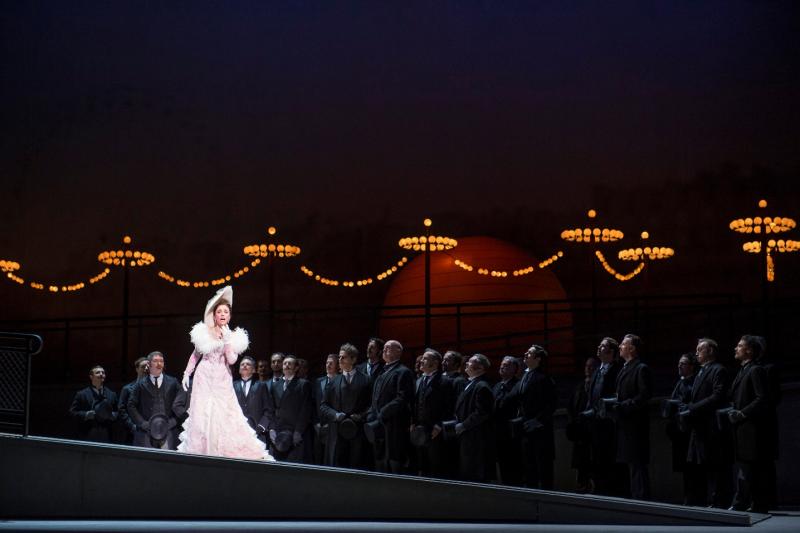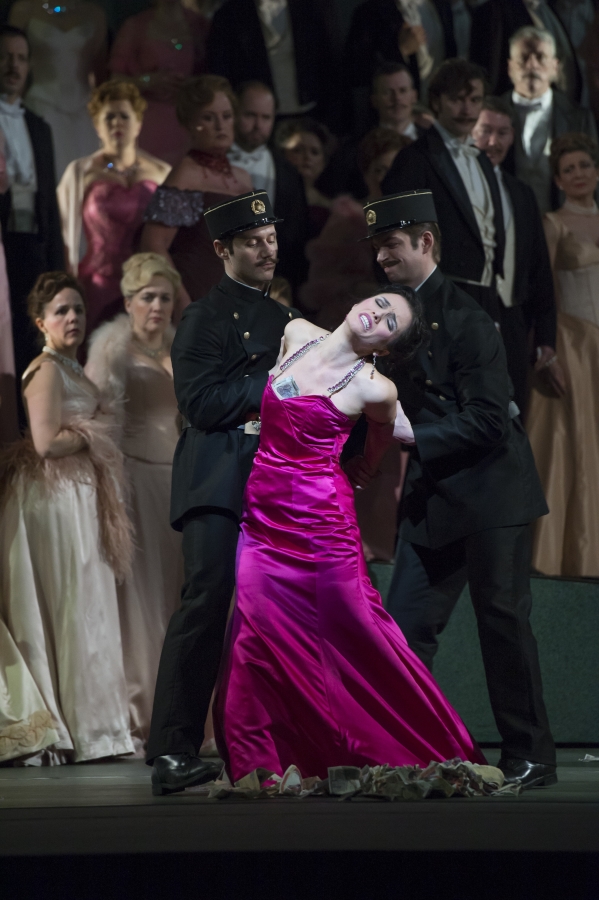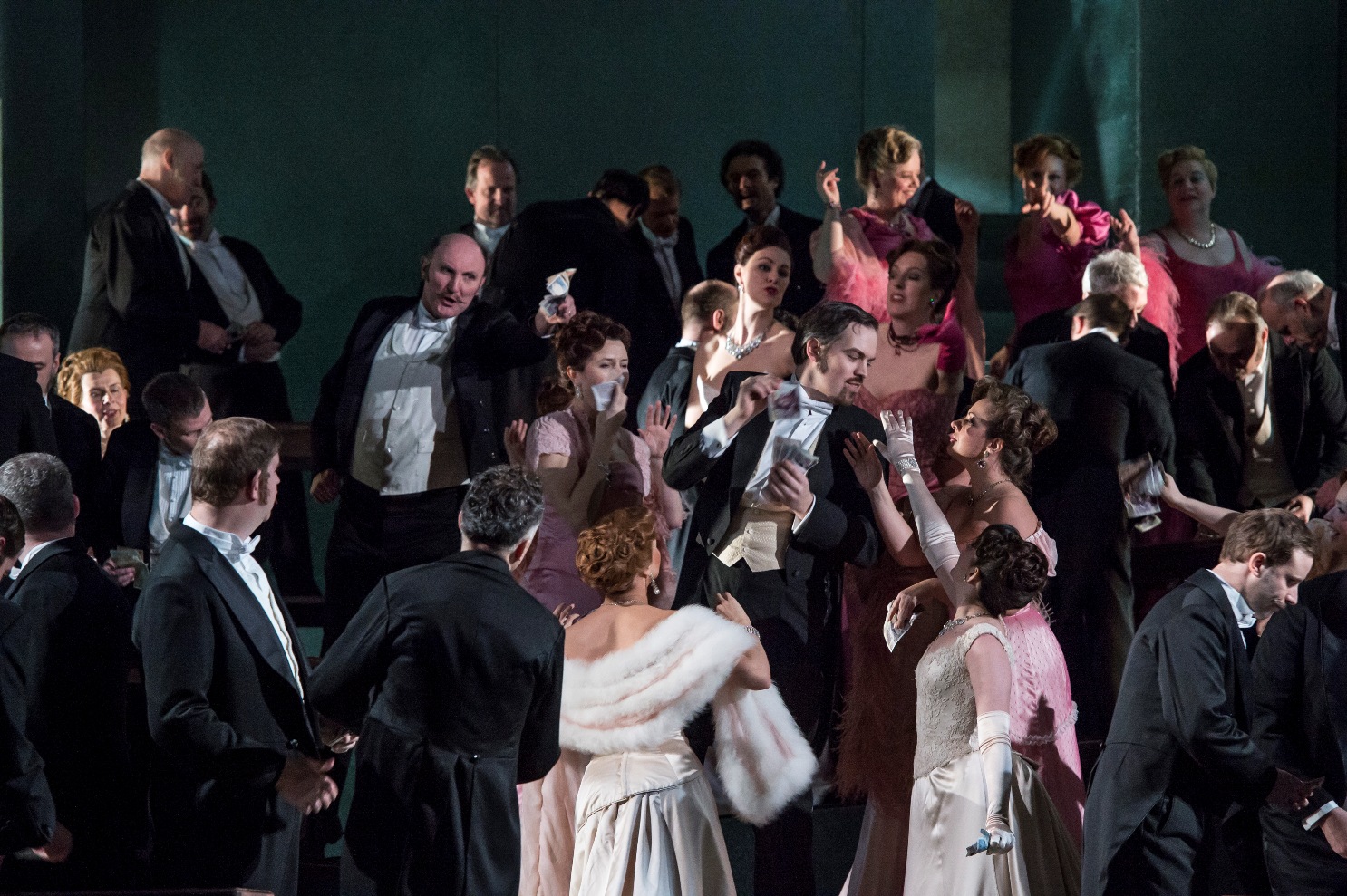Manon, Royal Opera | reviews, news & interviews
Manon, Royal Opera
Manon, Royal Opera
Massenet's delicate tale of a pleasure-loving girl in a man's world needs more heart

Massenet had just two lingering thoughts about Manon when he wrote his memoirs in 1910, a quarter-century after the opera's first performance. First, he enjoyed reminding himself how many times it had been performed (a staggering 763 by the time he finished the memoirs).
In both these respects, this Covent Garden revival of Laurent Pelly's production is swimming against the tide. Manon is not the box office draw it once was. The performances in this run are also all on weekdays, they start at 6.30pm, and finish a few minutes short of four hours later. Furthermore, the original run's star soprano Anna Netrebko - around whom the production, shared with New York, Milan and Toulouse, and first heard here in 2010, was built - has left the cast, and been replaced on this run by two less well-known singers, the Albanian Ermonela Jaho for the first five performances, then American Ailyn Pérez for the last two.
 Jaho (pictured right) received a very warm accolade at the end of the show from the opening night house, but in solo passages occasionally sounded as if she were "marking" the part for a rehearsal rather than fully singing out. Only towards the end did I get the sense that she was connecting with the audience.
Jaho (pictured right) received a very warm accolade at the end of the show from the opening night house, but in solo passages occasionally sounded as if she were "marking" the part for a rehearsal rather than fully singing out. Only towards the end did I get the sense that she was connecting with the audience.
The production doesn't help communication. Laurent Pelly has talked about the detached perspective he likes to bring to everything he does, saying in an interview that "the critical gaze is always the backdrop to my creations" and that "I look at the world and at people through that filter and hold it up to the public as a mirror." That approach of distancing a creation has its limitations with a work which wears its heart on its sleeve. Characters are disappearing where they should be imposing themselves. Was it my imagination, or was American tenor Matthew Polenzani often required to walk backwards and upstage?
Among the minor roles, two in particular left a strong impression: Alastair Miles as Des Grieux (senior) was not just in fine voice; he brought a sureness of touch to every phrase. Christophe Mortagne played the demanding character part of Guillot with panache. His progression during the evening from a ridiculous buffo, you're-not-kidding-anyone suitor through to an implacable man seeking vengeance by the end was expertly handled.
Chantal Thomas's designs, evoking the Belle Époque, the time of the opera's composition, and reminiscent of the Parisian paintings of Jean Béraud, are beautiful. The approach is historically coherent too. There is a lot of Zola's Rougon-Macquart in general, and of Nana (published in 1880, four years before Manon) in particular, in Meilhac and Gille's view of the world in their adaptation of Abbé Prevost's novel.
The final scene looks to be set anachronistically on an airport runway, but the desolation works well. Jorge Lavelli used to pull off that effect expertly, letting the bleakness of an empty stage home the audience's attention in on the lonely plight of the protagonists.
 I have to say that one other anachronism completely infuriated me: Pelly and Thomas have made the dress, the pout and the gesturing of Act IV Scene 1 into a shameless, direct lift from Madonna's Material Girl video of 1984. That, surely, is a misjudgment.
I have to say that one other anachronism completely infuriated me: Pelly and Thomas have made the dress, the pout and the gesturing of Act IV Scene 1 into a shameless, direct lift from Madonna's Material Girl video of 1984. That, surely, is a misjudgment.
The orchestra under conductor Emmanuel Villaume was having a very good night indeed. Perfect woodwind tuning, balance and shaping are not things which a listener can or should ever take for granted on a first night. Villaume also gives himself and his singers plenty of freedom and allows phrase length to flow, to follow rhetoric and gesture, rather than trying to assert a pulse. The slower passages hinting at Rameau and Lully were brought out quite beautifully. The climaxes at the end of scenes grew inexorably, with the one at the end of Act III Scene 2 stupendous. The chorus (pictured above) were also on fine form, though the production ensured they received embarrassed rather than appreciative applause when the octet of female ballet dancers was bodily removed, legs beating in the air, by men in suits, to an uncertain fate.
This was a solid performance, though with enough of the virtues and high standards of the Royal Opera company on display to make a worthwhile evening. There will be seats to spare, indeed some discounting has aleady started. I was picking up more of a buzz about the prospect of Ailyn Pérez taking up the role later in the run, by which time orchestra and chorus will no doubt also be reaching the heights.
rating
Explore topics
Share this article
Add comment
The future of Arts Journalism
You can stop theartsdesk.com closing!
We urgently need financing to survive. Our fundraising drive has thus far raised £49,000 but we need to reach £100,000 or we will be forced to close. Please contribute here: https://gofund.me/c3f6033d
And if you can forward this information to anyone who might assist, we’d be grateful.

Subscribe to theartsdesk.com
Thank you for continuing to read our work on theartsdesk.com. For unlimited access to every article in its entirety, including our archive of more than 15,000 pieces, we're asking for £5 per month or £40 per year. We feel it's a very good deal, and hope you do too.
To take a subscription now simply click here.
And if you're looking for that extra gift for a friend or family member, why not treat them to a theartsdesk.com gift subscription?
more Opera
 Madama Butterfly, Irish National Opera review - visual and vocal wings, earthbound soul
Celine Byrne sings gorgeously but doesn’t round out a great operatic character study
Madama Butterfly, Irish National Opera review - visual and vocal wings, earthbound soul
Celine Byrne sings gorgeously but doesn’t round out a great operatic character study
 theartsdesk at Wexford Festival Opera 2025 - two strong productions, mostly fine casting, and a star is born
Four operas and an outstanding lunchtime recital in two days
theartsdesk at Wexford Festival Opera 2025 - two strong productions, mostly fine casting, and a star is born
Four operas and an outstanding lunchtime recital in two days
 The Railway Children, Glyndebourne review - right train, wrong station
Talent-loaded Mark-Anthony Turnage opera excursion heads down a mistaken track
The Railway Children, Glyndebourne review - right train, wrong station
Talent-loaded Mark-Anthony Turnage opera excursion heads down a mistaken track
 La bohème, Opera North review - still young at 32
Love and separation, ecstasy and heartbreak, in masterfully updated Puccini
La bohème, Opera North review - still young at 32
Love and separation, ecstasy and heartbreak, in masterfully updated Puccini
 Albert Herring, English National Opera review - a great comedy with depths fully realised
Britten’s delight was never made for the Coliseum, but it works on its first outing there
Albert Herring, English National Opera review - a great comedy with depths fully realised
Britten’s delight was never made for the Coliseum, but it works on its first outing there
 Carmen, English National Opera review - not quite dangerous
Hopes for Niamh O’Sullivan only partly fulfilled, though much good singing throughout
Carmen, English National Opera review - not quite dangerous
Hopes for Niamh O’Sullivan only partly fulfilled, though much good singing throughout
 Giustino, Linbury Theatre review - a stylish account of a slight opera
Gods, mortals and monsters do battle in Handel's charming drama
Giustino, Linbury Theatre review - a stylish account of a slight opera
Gods, mortals and monsters do battle in Handel's charming drama
 Susanna, Opera North review - hybrid staging of a Handel oratorio
Dance and signing complement outstanding singing in a story of virtue rewarded
Susanna, Opera North review - hybrid staging of a Handel oratorio
Dance and signing complement outstanding singing in a story of virtue rewarded
 Ariodante, Opéra Garnier, Paris review - a blast of Baroque beauty
A near-perfect night at the opera
Ariodante, Opéra Garnier, Paris review - a blast of Baroque beauty
A near-perfect night at the opera
 Cinderella/La Cenerentola, English National Opera review - the truth behind the tinsel
Appealing performances cut through hyperactive stagecraft
Cinderella/La Cenerentola, English National Opera review - the truth behind the tinsel
Appealing performances cut through hyperactive stagecraft
 Tosca, Royal Opera review - Ailyn Pérez steps in as the most vivid of divas
Jakub Hrůša’s multicoloured Puccini last night found a soprano to match
Tosca, Royal Opera review - Ailyn Pérez steps in as the most vivid of divas
Jakub Hrůša’s multicoloured Puccini last night found a soprano to match
 Tosca, Welsh National Opera review - a great company reduced to brilliance
The old warhorse made special by the basics
Tosca, Welsh National Opera review - a great company reduced to brilliance
The old warhorse made special by the basics

Comments
What a beautifully written,
I don't agree. The critic